The European Language Equality Network celebrated a highly successful General Assembly from November 10th to 11th in Valencia, hosted by the leading Valencian language and culture NGO Acció Cultural del País Valencià (ACPV) in the iconic Octubre Cultural Centre, and supported by the Valencian Government and the University of Valencia.
The meeting was opened by and ELEN President Ferran Suay and Secretary-General Davyth Hicks who welcomed all the delegates, the new members, and also spoke about the recent events in Catalonia, the imprisonment of members of the Catalan Government and civil rights leaders, in particular Jordi Cuixart the leader of ELEN member organization Òmnium Cultural.
Language and Power
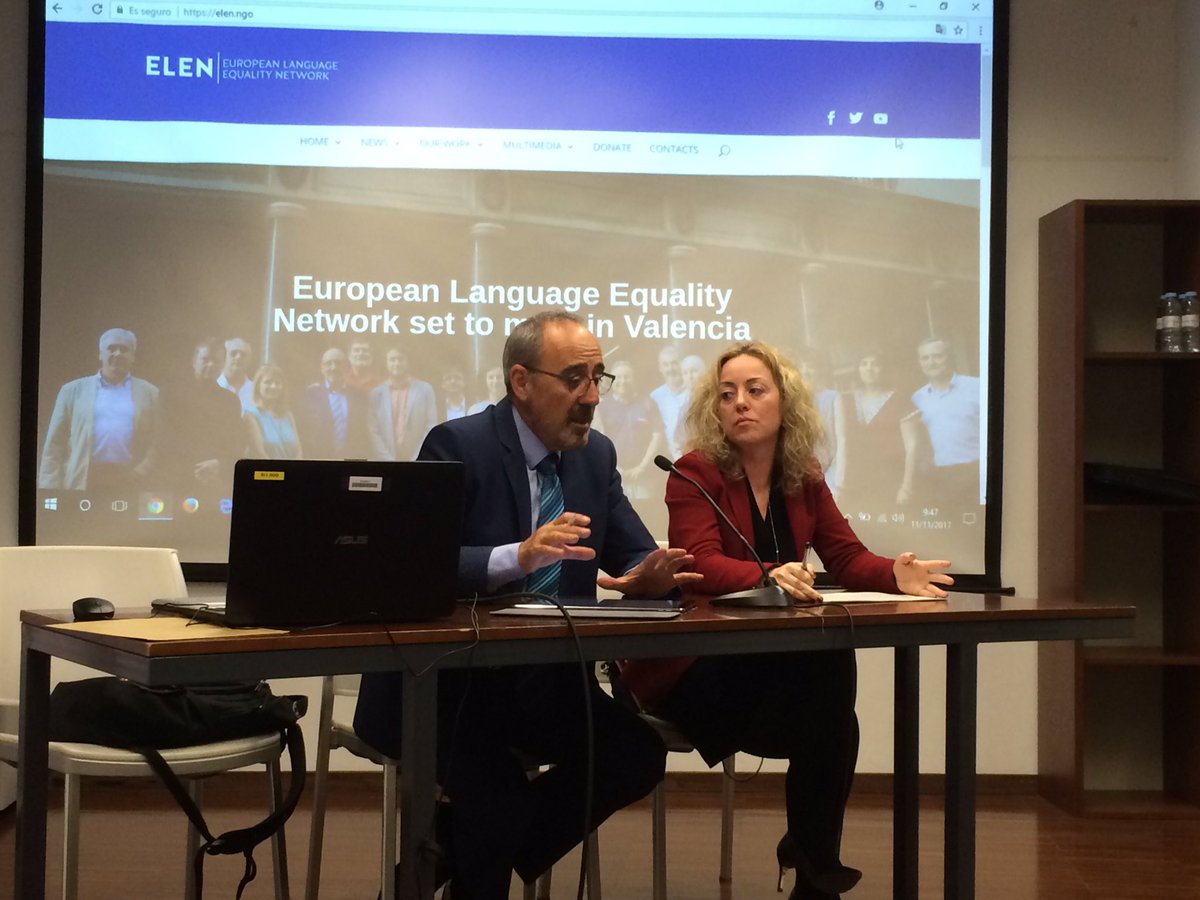
Ferran Suay and Vicenta Tasa, language and power.
The public part of the meeting started with two keynote speeches from Valencia’s leading experts on constitutional law and language rights, Prof. Vicenta Tasa and Prof. Anselm Bodoque. Vicenta Tasa discussed language and power, how Castilian is officially the language of the state but not that of all Spaniards, while co-official languages are only official in their own territory, leading to a linguistic hierarchy. Anselm Bodoque noted the difference between theory and practice with regard to the use of Valencian in the institutions.
Guest speaker Neil McEvoy AM (Plaid Cymru) covered the effect of Brexit on the Celtic languages. He highlighted the net financial losses that Wales will face from leaving the EU especially funding for farmers, many of whom form the backbone for numerous Welsh-speaking communities and who already live on a marginal wage. While Brexit may be a huge challenge Mr McEvoy looked to the future, noting many of the successes for the Welsh language movement, and the ambitious target of one million speakers by 2050. “As the Welsh saying goes,” he said, ‘Yma o hyd’ – we’re still here.”
This year’s meeting featured four panels with the entitled: language and legislation and how legislation helps revitalization; the effect of Brexit on the Celtic languages; the importance of digital development for lesser-used languages, featuring the Digital Language Diversity Project; and the EU’s failure to uphold fundamental rights in Catalonia, and the implications for civil society. The conclusions from the panels will be used to guide ELEN’s advocacy and project work for the future.
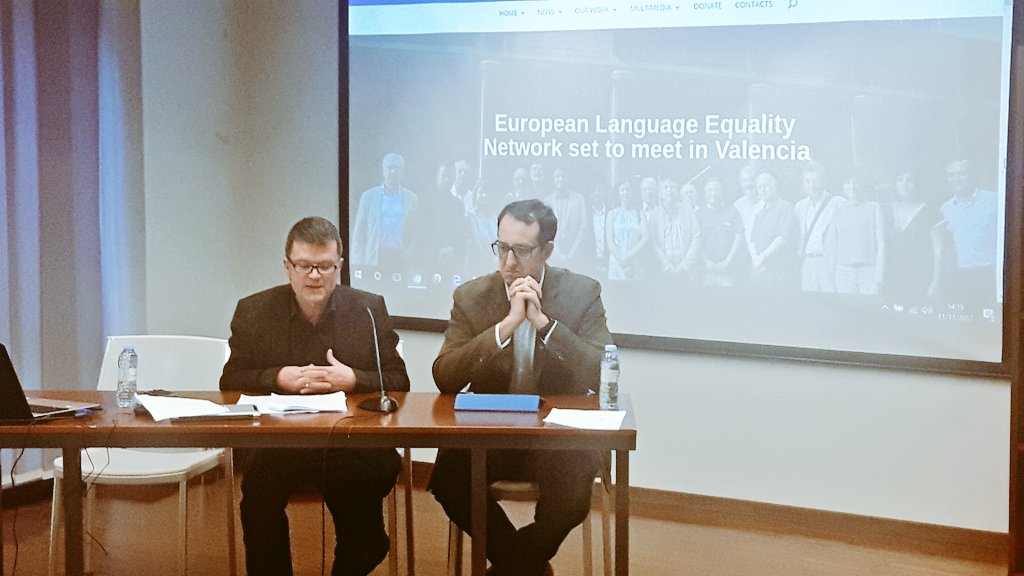
Davyth Hicks and Nacho Amadoz on fundamental rights in the EU.
ELEN members were delighted to welcome five new members: the University of Valencia represented by Vice-Rector Prof. Maria Vicenta Mestre who held an official joining ceremony and reception on Friday evening; the Frisian NGO Afûk, presented by Douwkje Douma-Zijlstra; Fundació PuntCat represented by Cira Perez and Nacho Amadoz; the Babel Film Festival represented by Tore Cubeddu and Antonello Vinci; and the Sardinian NGO Comitadu pro su Sardu Ufitziale (CSU) presented by Nicola Merche.
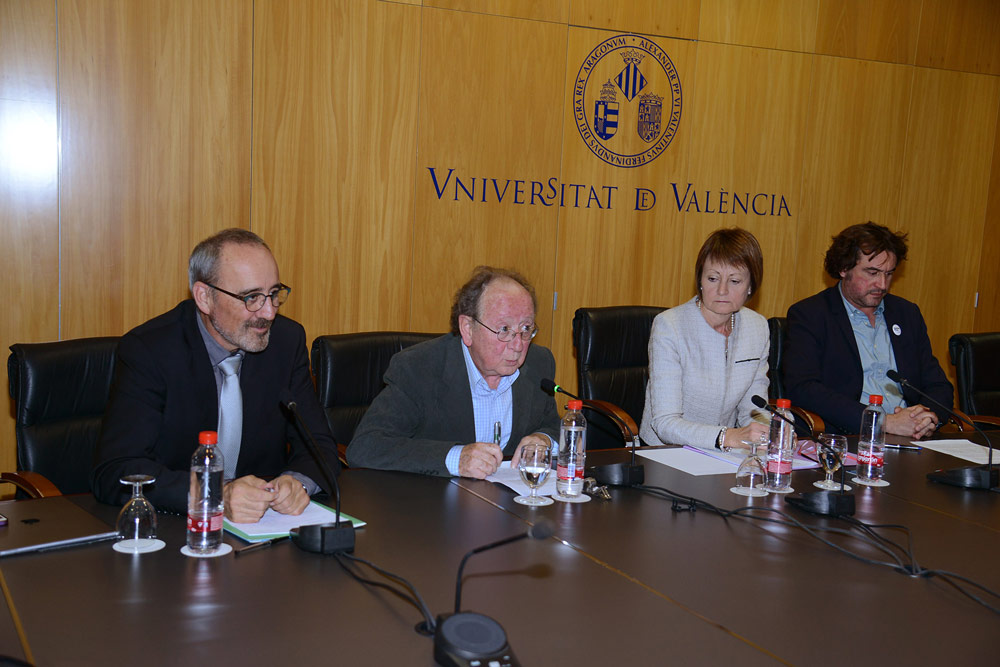
University of Valencia joins ELEN, (L-R) Ferran Suay ELEN President, Joan Mira ACPV President, Vice-Rector Maria Vicenta Mestre Univ. of Valencia, Rubén Trenzano D-G Language Policy Valencian Government
ELEN’s achievements over the past year, current work programme, and priorities at the European and international levels were discussed by Davyth Hicks, with Tangi Louarn (Kevre Breizh) outlining ELEN France’s current initiatives at the UN.
ELEN Resolutions
ELEN voted on five resolutions. Firstly, Conchúr Ó Giollagáin (Soillse) proposed that the ELEN research network organize a conference on the development of civil society leadership from within lesser-used language communities and to look at the social reality of those communities with regard to language revitalization. The Resolution passed unanimously.
The second resolution, for a formal message to Fernand de Varennes congratulating him on his appointment as UN Special Rapporteur on Minorities, passed unanimously.
The Plataforma per la Llengua Resolution, presented by Rosa de les Neus Marco calling for the release of Catalan political prisoners and that the Spanish Government cease publically undermining Catalan-medium education, was supported unanimously.
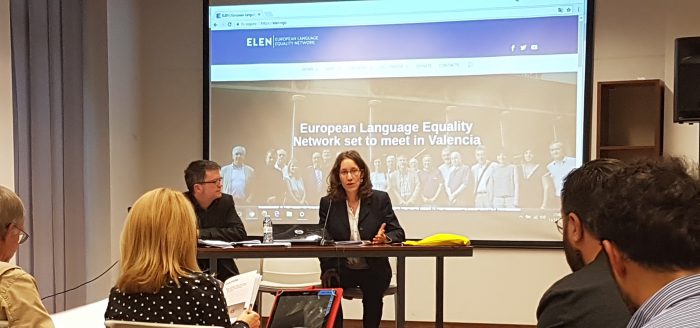
Rosa de les Neus Marco presents the Plataforma per la Llengua resolution on Catalonia.
The ACPV resolution, presented by Ferran Suay, calling for the release of Catalan political prisoners also passed unanimously. Both Catalan resolutions will be sent to the Spanish Government and the EU.
Finally, the A Mesa pola Normalización Lingüística resolution that ELEN supports the legal proposal for the guarantee of linguistic rights in the socioeconomic field, a Galician legislative initiative where 28,000 signatures have been collected (10,000 are usually required reflecting the huge support for the proposal), passed unanimously. To implement the resolution ELEN will be contacting all the parties in the Galician Parliament to call for their support. The proposal will also act as a first step for Galicia to comply with the Donostia Protocol. The resolution will be sent to the Galician Government.
ELEN is the European NGO that works for the promotion and protection of European lesser-used languages representing 45 languages with 150 member organisations in 23 European states. It has consultative status with the UN, the Council of Europe, UNESCO, and the European Parliament.
ELEN GENERAL ASSEMBLY 2017 Plataforma RESOLUTION ON THE SITUATION IN CATALONIA

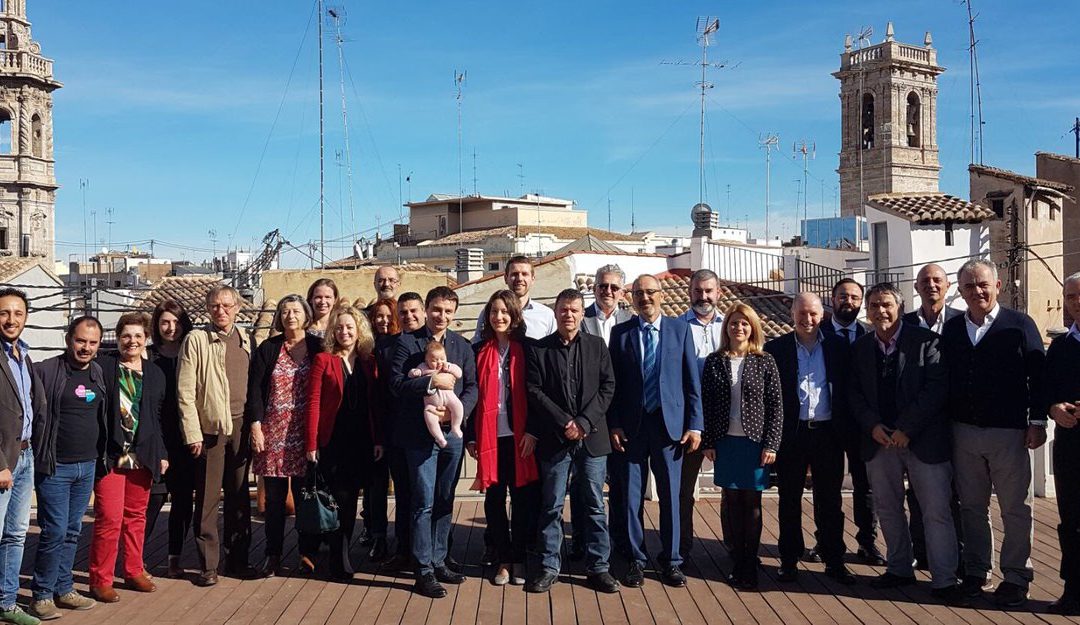
diolch am yr adroddiad yma yn dilyn y cyfarfod yn Valencia. Rwy n dilyn y selfyllfa yng Ngatalunya ar y we- trwy ddarllen yn Sbaeneg ond hefyd ar adegau trwy r iaIth Gatalaneg trwy adroddiadau yn y wasg ag ar y we. Mae clywed yr iaith yn cael ei defnyddio fel hyn yn hwb enfawr . Mae r sefyllfa ohoni yn creu ymwybyddiaeth gref o r iaith gan ei bod yn ei chlywed yn ddyddiol yn y cyfryngau.
Cefnogaf y galwad i ryddhau aelodau o lywodraeth Catalunya o r carchar. Diolch
for a translación- beth@cowbois.com